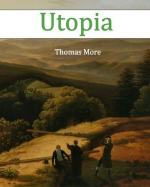|
This section contains 2,724 words (approx. 10 pages at 300 words per page) |

|
UTOPIA. The term utopia (from the Greek ou-topos, "no place," or eutopos, "good place," and evidently coined as a pun by Thomas More for the title of his book published in 1516) has very diverse, often confusing connotations. Sometimes it is used to mean any idealization of the distant or primordial past, when humans lived closer to the gods (or God), as found in Sumero-Akkadian cuneiform accounts of Dilman; in the Hebrew story of Eden of Genesis; in portrayals of the Golden Age by Hesiod, Vergil, Symmachus, and other Greek and Roman writers; in myths of the "perfect great period" (kṙtayuga, suśamā, etc.) in later Vedic, earlier Jain, and Buddhist traditions; or in accounts of the early age of the four (mythic) emperors of popular Chinese thought. In some ancient cultures, the original inhabitants of certain foreign regions were imagined to live in an innocent, trouble-free state...
|
This section contains 2,724 words (approx. 10 pages at 300 words per page) |

|


